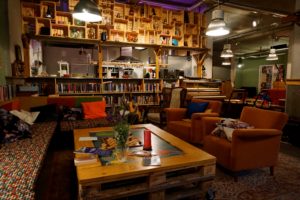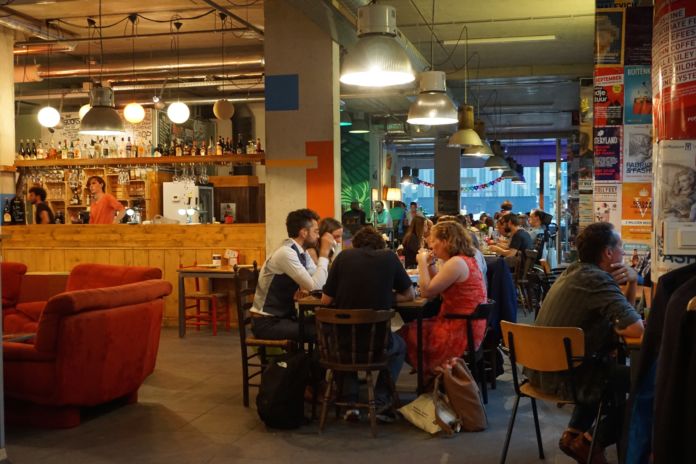With a seed of inspiration from his world travels, a little encouragement, three paella pans and a microwave oven, Thomas Thijs became an entrepreneur and the concept for Soul Kitchen was borne in Eindhoven.
I was just excited to hear of a local restaurant specializing in healthy, sustainable food. It was both intriguing and breathtaking to find out how Soul Kitchen came to be, and that the soulful magic they make in their kitchen reaches far beyond their delicious food.
After enjoying dinner with my husband on a busier-than-usual Friday night at Soul Kitchen, I had the pleasure of chatting with Thomas over a glass of wine about his unexpected journey toward becoming a restaurant owner. He asked how we enjoyed the meal. We had tried all three of the daily entrees on the menu, which included a chicken dish with carrots, beans and a yogurt/harissa sauce; a
Norwegian salad with a steamed salmon burger, bean sprouts, black sesame, cucumber, artichoke, fennel and a yogurt lime dressing; and bulgur salad with falafel, pomegranate, sundried tomatoes, grilled zucchini and peppers with a tahini lemon sauce.
At Soul Kitchen, it’s perfectly fine to try a little bit of everything as the menu is all-you can eat for a very reasonable €9.50. We told Thomas that we enjoyed all of the entrees, appreciated the variety, and also liked that the menu was simple and straightforward, and guaranteed to be fresh. We also complimented the comfortable atmosphere, which includes indoor and outdoor seating, as well as a cozy living room area with tables, couches, a small stage and microphone, books, and games.
The dining experience is only the most obvious product of the sophisticated, if unexpected, inner workings and mission of Soul Kitchen.
After everyone was served and the evening rush was dying down, Thomas pulled a few of the cozy living room chairs from inside out onto the patio for us to sit on, and started to dish about how he came into the restaurant business. His initial intention, he said, had been to open a hostel in Eindhoven. Having traveled quite a bit by himself and spending a good deal of time in hostels, he had enjoyed the atmosphere where travelers met and spent quality time getting to know one another. He wanted to open such a place to Eindhoven.
Three years of drafting business plans and visiting various buildings in Eindhoven finally led him to a discussion with Cees van Pagee, Director of Futuris, an agency that helps to guide young adults with autism, Asperger, ADHD and related disorders to develop workplace skills and find productive work in the community. Futuris also collaborates with local businesses to create safe and suitable workplaces for training their clients to be successful in normal workplaces. Thomas was shown the space at Strijp S, at 55 Torenallee, where Soul Kitchen currently resides, and fell in love with it. He was referred to speak further with van Pagee. The space was not ideal for a hostel, but had good potential for a restaurant. “It took half an hour and I was sold on the concept and the space.”
“I had no money. Futuris gave me a starting budget of 2000 Euros. I scrounged stuff everywhere, tables, chairs…anything I could find from friends and family.” He explained that €2000 doesn’t buy a whole lot of restaurant equipment, but he was able to acquire 3 paella pans and a microwave oven. Building began in 2014, and took about a year before Soul Kitchen was ready to open.
Soul Kitchen works in collaboration with Futuris, which refers clients for training. “We find the right spot for each client,” explains Thomas. Clients receive professional guidance, and an opportunity to assimilate into a normal restaurant environment. “It’s like a warm bath here. Everyone is extremely polite to each other. There’s no work pressure.”

The Chefs are professionals, and they work with a team of guys or girls with diagnoses. “(Our clients are) extremely clever; they’ll do exactly what you say. You have to be extremely specific.” Soul Kitchen currently has about 15-20 clients working in various roles in the restaurant. The intention is to train them; make them confident enough to find their own job.
“The serving staff is hired staff. ‘They are flexible and hardworking. We need to rely on them.”
Thomas emphasizes that working at Soul Kitchen is really fun for everyone involved. “We really need to be warm and cozy and like a living room for everybody. I really want the staff to be a big group of friends together, instead of just coming here to work for the money.”
He says of Soul Kitchen’s clients, “they are exceptional people.” At the same time, “It can be a bit of a gamble. Some nights we need to run twice as hard….We can’t be a Michelin Star restaurant. Sometimes we mess up.”
The menu concept is simple; there are three entrees on the menu every day, a meat, fish and vegetarian option. The menu changes weekly. “We can be more efficient this way, without throwing away food.” Thomas feels this is really important. The concept is “healthy, plenty, simple.”
Cesar is a client who works in the kitchen and told me why he feels it’s a good atmosphere to work in. “It’s great. I want to work here because I want to learn to work in a restaurant. Here it’s very simple – 3 courses. It’s very predictable. Eric (the chef) is a very good teacher and very patient. He lets you do something wrong, and tells you what you should have done. You’re allowed to make a mistake.” Cesar was recently given additional responsibilities and invited to cook. Before that, he had been doing prep work, such as cutting vegetables.
My impression of Soul Kitchen is reminiscent of a hearth, around which a family gathers to cook, laugh, share, relax, and enjoy wholesome food; a tradition that represented the center of the household, and in fact the center of the community, in many ancient traditional and tribal cultures. Perhaps here we find a modern rekindling of this tradition that has been all but lost to “progress,” work schedules, and fast food.
Thomas told me he still wants to open a hostel someday, but for now is feeling really good about his work at Soul Kitchen. Two things he’s really proud of are helping people who would otherwise have difficulty dealing with society to do well, and creating a system that minimizes food waste. He extends an invitation to the community: “I’ve traveled quite a bit by myself. I wish there was something like this in the cities I’ve traveled. You can relax and play a game here. People mingle very well here. For people alone in the city, I’d like to encourage them to come here and be part of the community. You don’t have to order; you can just sit here and relax.”
The weekly menu and calendar of events can be found on the restaurant’s Facebook page.
Jennifer M
















